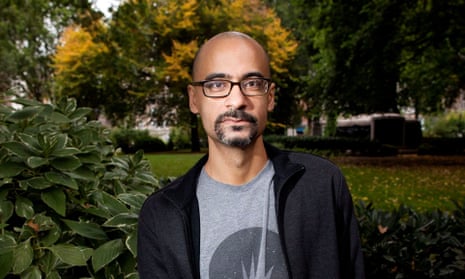When the American Libraries Association awards its Andrew Carnegie medals in New Orleans later this month, there will be no winner for excellence in non-fiction. Sherman Alexie, the poet and novelist who was due to receive it for a memoir, You Don’t Have to Say You Love Me, has declined the award following allegations of sexual harassment.
Last month, the novelist Junot Díaz withdrew from the Sydney writers’ festival and from chairing the Pulitzer prize board after being confronted by his own accusers. As the allegations swept through social media, another writer, Mary Karr, joined the fray, tweeting of her distress that her testimony to DT Max, the biographer of her one-time partner David Foster Wallace, about Foster Wallace’s abusive behaviour had been marginalised. “Deeply saddened by the allegations against #JunotDiaz & I support every woman brave enough to speak. The violence #DavidFosterWallace inflicted on me as a single mom was ignored by his biographer & @NewYorker as ‘alleged’ despite my having letters in his hand,” she wrote.
Such high profile cases are far from rare as the #MeToo movement spreads across the creative industries. They come at a time when writers are facing increasingly draconian attempts by publishers to police their behaviour, calling into question centuries old assumptions about the desirability – or even the possibility in today’s networked world – of separating writers’ lives from their work.

Sexual harassment might be the most acute manifestation of this crisis but it is only one aspect of it. Last year, Simon & Schuster cancelled a book by the rightwing provocateur Milo Yiannopoulos after comments he had made about sex between men and “younger boys” put an abrupt end to tolerance of his controversialist views. Just months earlier, when the book deal was announced, human rights organisations had rallied to defend the firm’s right to publish his autobiography, Dangerous, however objectionable his views were held to be.
Cancelling contracts is a costly and legally dangerous business for publishers – as the Yiannopoulos case revealed. It involved waving goodbye to a reported $250,000 advance, and Simon & Schuster only avoided being sued for breach of contract when the disgraced author opted to drop the lawsuit and self-publish instead. The fear among authors and agents is that the case will be seen to strengthen the argument for personal behaviour to be written into author contracts.
Morality, or morals, contracts have existed in the film industry since 1921, when Universal Pictures introduced them in response to Fatty Arbuckle’s trial for manslaughter, but they are relatively new in the publishing industry. One such clause, introduced by HarperCollins in the US, stipulated that the publisher could terminate a contract in cases of “conduct [that] evidences a lack of due regard for public conventions and morals”, or in the case of a “crime or any other act that will tend to bring the Author into serious contempt, and such behaviour would materially damage the Work’s reputation or sales”. Caroline Michel, a leading literary agent, said this week that the use of morality clauses had doubled in the US over the past year. In a recent speech, Royal Society of Literature president Marina Warner warned that “being good” should not be conflated with “good writing”. But where is that line drawn?
Clearly, reputation doesn’t matter to a controversialist in the way it does to literary authors such as Alexie or Díaz, who are facing serious damage to their careers. In the weeks since 10 women came forward with accusations against Alexie, the Native American author has been subjected to a cascade of punitive measures. His name has been stripped from a scholarship awarded by the Institute of American Indian Arts, all references to him have been “deleted or modified” in the blog Native Americans in Children’s Literature, bookshops and libraries are destocking his books and his US publisher has said that it will be postponing the paperback of his memoir (though his UK publisher, Penguin Random House, says it will continue to reprint his work as required).

Díaz’s US publisher scrapped the publicity schedule for his children’s picture book Islandborn, and his forthcoming public lectures have been cancelled. His UK publisher Oneworld has confirmed it is going ahead with publication, but will postpone it until the autumn. Meanwhile, this month three editors resigned from the Boston Review after the magazine, where Díaz has worked as fiction editor since 2003, announced that it was keeping him on, because “the objectionable conduct described in the public reports does not have the kind of severity that animated the #MeToo movement”.
Shortly before the accusations – in what has been denounced by his detractors as a pre-emptive move – Dominican American Díaz wrote a long and moving confessional in the New Yorker about the legacy of damage inflicted on him by being raped as a child. Supporters in the academic world have rallied round him with an open letter in the Chronicle of Higher Education claiming that the “(at times uncritical) reception and repetition of the charges ... amounts to a full-blown media-harassment campaign”. While not dismissing the allegations, the 26 signatories, who include professors from Harvard, Yale, New York, California and Florida, warn that “the … characterization of Díaz as a dangerous and aggressive sexual predator from whom all women must be protected reinforces racist stereotypes”.
The high emotions surrounding the behaviour of writers are starkly exemplified by the case of Foster Wallace. Though Karr feels understandably aggrieved that her experience wasn’t taken more seriously by his biographer, she would be wrong to think it wasn’t noted. In a blog written at the time, Kristen Roupenian – who went on to write the New Yorker short story sensation “Cat Person” – described her dismay at discovering in Max’s book that the literary hero she worshipped as a student would probably have dismissed her as “audience pussy”.
She wasn’t looking for a boycott of his work, she wrote. “All I expect is a quiet, un-showy disqualification for the role of hero, mentor or saint. I would like the ‘statue’ (Wallace’s word) of his public image to be carefully dismantled, for the overblown ideas we have of him and what his life meant to slowly begin to deflate. I would like him to become just another writer, imbued with no moral authority beyond what is contained in his words on the page.”
Her blog predates #MeToo, but by 2012 – when the biography was published – some US publishers had already begun to introduce morality clauses. Though they are so far confined to academic presses in the UK, a literary agent who wishes to remain anonymous says “the conversations have started among publishers about this issue. Are [morality clauses] here? Probably not. Are they coming? Most definitely. Whatever happens in the US eventually ends up in London because these are global companies.” Michel says her firm has worked hard to limit the scope of US morality contracts, so that, for example, instead of applying to an author’s behaviour at any time in the past or future, the clause only applies to the period of publication. In any case, she asked, “who decides what past or future conduct of the author is appropriate or not?”

As the pressure has mounted, London-based authors’ agent Lizzy Kremer has taken pre-emptive action – drawing up a new, industry-wide code of conduct on behalf of a coalition of authors, booksellers, agents and publishers. The voluntary code was partly inspired by London’s Royal Court theatre, which constructed one in reaction to its own sexual misconduct scandal involving a former artistic director. Among the theatre’s first responses was a call out for testimony about sexual harassment to help it to identify “patterns and scenarios”. In a detail that chimes strongly with the publishing industry, the report drew attention to the dangers of a “blurred social context”: “13.3% of reported incidents happened at work parties … with alcohol.”
“Publishers feel an obligation to use their personal social media accounts to publicise books and to go out for drinks,” says Kremer. “People forget that these are not friendships, they are friendly business relationships. You have to understand what’s off limits.”
In a personal blog, she recalled meeting up with a younger woman who told her of several “small yet frightening liberties” that men in publishing had taken at parties and in offices over the years. “One of the things that interested me about the [Royal Court] report was its emphasis on the vulnerability of the creative person,” says Kremer. “Obviously it’s not the same in publishing – you don’t have to get changed in communal dressing-rooms – but it’s another industry with a culture of asking employees to give something personal of themselves.”
The urgency of addressing these issues is not simply about protecting those who work in the industry, but of finding a way to safeguard the freedom of literature itself. When the Díaz story broke in the US, Elleke Boehmer, professor of world literature in English at Oxford University, considered whether his Pulitzer prize-winning novel The Brief Wondrous Life of Oscar Wao should be taken off her teaching syllabus. Her department decided to let it stay on the grounds that “what would be really valuable would be not to block writers’ voices, but to put others alongside these authors who are now being deplatformed”.
“We’ve been here before,” says a senior UK biographer, who declined to be named, citing the furore over Philip Larkin’s racism and misogyny, which threatened to obliterate his reputation after the publication of his Selected Letters in the early 1990s. “Yes, I am fearful that wonderful writers with horrible personal lives are going to fall out of the literary canon because of their terrible behaviour. Puritanism isn’t good for literary understanding.”
But these are different times, in which technological changes have created unprecedented forms of accountability. For Kremer, finding a way forward involves responsibility all round – a challenge that is especially tough in an era when reputations can be made or destroyed with an anonymous comment beneath an article, or a single tweet. Her hope is that new, negotiated social contracts will prove more powerful than no-platforming or the imposition of morality clauses that, as Nicola Solomon, CEO of the Society of Authors, points out, could be wrongly invoked to end contracts with writers whom publishers no longer wanted for reasons that had nothing to do with their morality.
Writers have a central role to play in exploring the nuances of the new, wired environment, whether through short stories, such as Roupenian’s “Cat Person”, which investigates the politics of unwanted sex, or novels such as Lisa Halliday’s recent Asymmetry, which examines the perils of cultural asymmetry in terms of both a young editor’s relationship with an famous older writer, and the right of a white, female writer to describe the experience of a young Iraqi-American man.
As Warner said in her speech: “Striving to be good is not the same as good writing. Engaging in fictive truth-telling is not the same as winning gold stars for conduct.”
